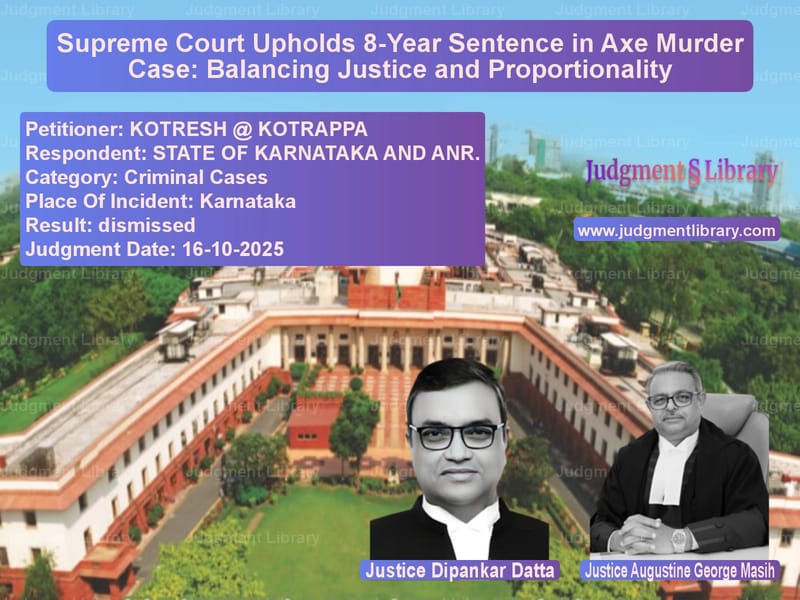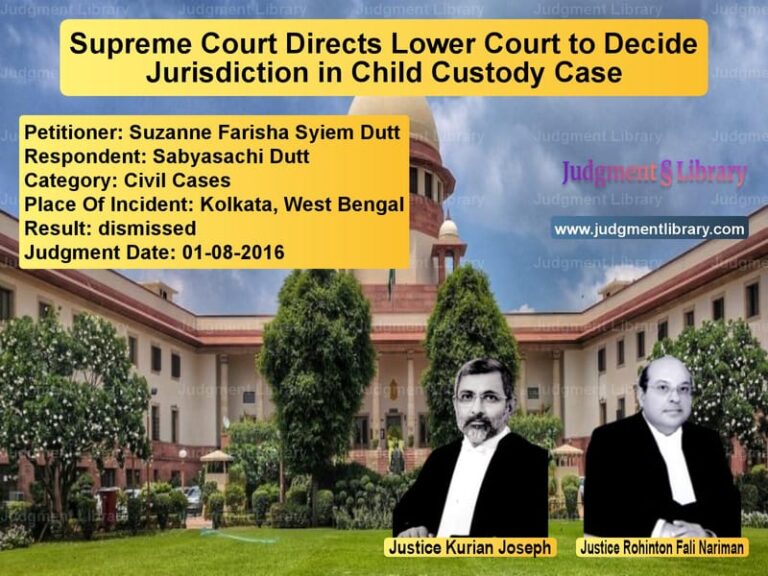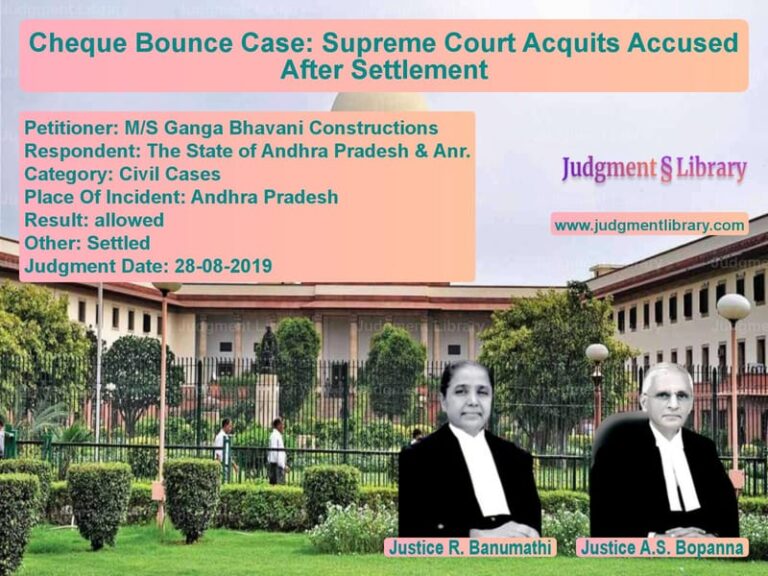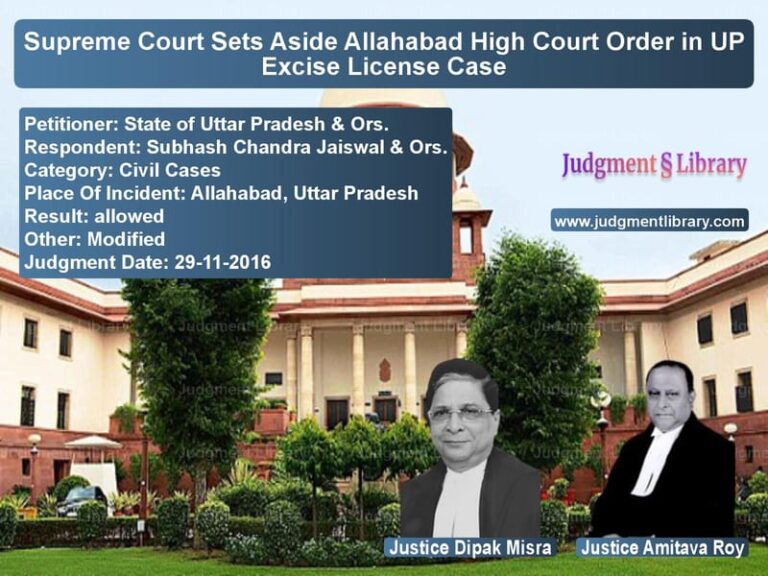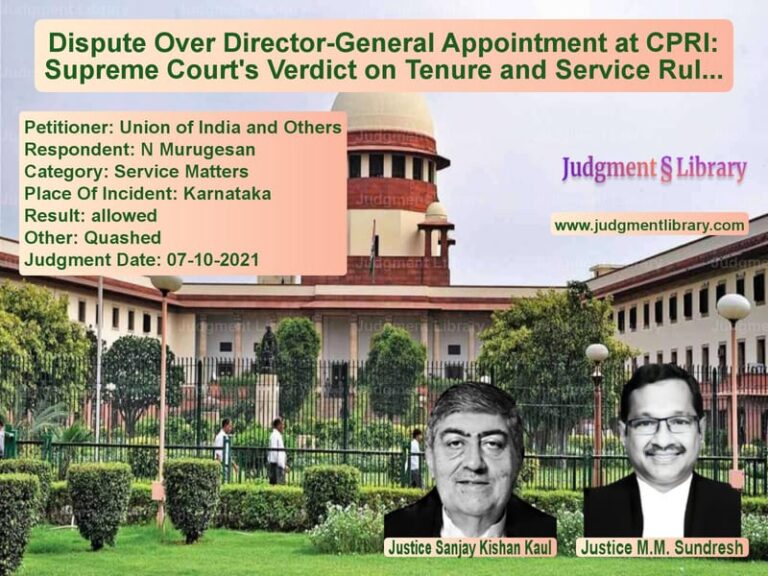Supreme Court Upholds 8-Year Sentence in Axe Murder Case: Balancing Justice and Proportionality
In a significant ruling that underscores the importance of proportionate sentencing in criminal justice, the Supreme Court of India recently dismissed an appeal seeking reduction of sentence in a tragic case of homicide. The case involved Kotresh @ Kotrappa, who was convicted for causing the death of an innocent bystander during a violent family altercation. The judgment highlights the delicate balance courts must maintain between showing mercy to offenders and ensuring justice for victims and society at large.
The Tragic Background
The case originated from a deeply distressing family situation. The appellant’s first cousin had allegedly been raped by the elder brother of the victim, leading to the birth of a child. While the alleged rapist was in custody facing trial, family members including the appellant’s family insisted that marriage be solemnized between the victim of rape and the accused. A day before the fatal incident, attempts to find a solution proved abortive, setting the stage for the tragic events that followed.
On the day of the incident, family members including the appellant stormed the residence of the alleged rapist’s family. An altercation led to a scuffle, during which the victim ‘S’ – a completely innocent person – intervened to bring about peace. At this critical moment, the appellant rushed to a nearby house, picked up an axe, and struck a fatal blow on S’s neck, leading to his immediate death.
The Legal Journey
The Sessions Court convicted the appellant under Section 304 Part-II of the Indian Penal Code for culpable homicide not amounting to murder and sentenced him to 10 years rigorous imprisonment. The High Court of Karnataka maintained the conviction but reduced the sentence to 8 years. Despite this partial success, the appellant approached the Supreme Court seeking further reduction of his sentence.
Arguments for Sentence Reduction
Mr. Rahul Kaushik, learned senior counsel for the appellant, presented several arguments seeking mercy for his client. He emphasized that the appellant was barely 20 years old at the time of the incident and had acted without premeditation, losing control of his senses when family members of the alleged rapist refused to agree to the marriage proposal.
Mr. Kaushik submitted that “the appellant, who was barely 20 years old on the date of the incident of crime, could not control his senses because the family members of V were not agreeable to his marriage with C and without any premeditation struck the fatal blow on S leading to his unfortunate death.” He further argued that “the appellant, behind bars for two and a half years, has suffered enough for the involuntary act and may be let off with a reduced sentence.”
Referring to the precedent in Deo Nath Rai v. State of Bihar, Mr. Kaushik urged the Court to consider reducing the sentence to the period already served or at least making a suitable reduction considering the circumstances.
The Prosecution’s Counter-Arguments
Mr. Ashok Gaur, appearing as amicus curiae for the complainant, vehemently opposed any reduction in sentence. He argued that this was not a spontaneous act but showed elements of premeditation. Referring to the evidence of PW-4, an injured eyewitness, Mr. Gaur pointed out that the appellant had specifically gone to a nearby house to fetch the axe before striking the fatal blow.
Mr. Gaur strongly emphasized the innocence of the victim, stating that “S was an intervenor who attempted to bring about peace and was himself a young man of 23 years” and that “the appellant took away S’s life by brutally killing him.” He contended that the Sessions Court should have convicted the appellant for murder under Section 302 IPC rather than the lesser charge of culpable homicide.
Citing Pulicherla Nagaraju v. State of A.P., Mr. Gaur outlined the factors that determine intention in homicide cases: “(i) nature of the weapon used; (ii) whether the weapon was carried by the accused or was picked up from the spot; (iii) whether the blow is aimed at a vital part of the body; (iv) the amount of force employed in causing injury; (v) whether the act was in the course of sudden quarrel or sudden fight or free for all fight…” and several other factors that collectively establish criminal intention.
The Supreme Court’s Reasoning
The Supreme Court, after careful consideration of all arguments and evidence, refused to interfere with the High Court’s sentence. The Court acknowledged that while the appellant might have had reasons to bear a grudge against the alleged rapist, this could not justify the killing of an innocent bystander.
The Court made a crucial observation about the victim’s role: “There is no allegation levelled by any witness that S was part of the altercation and the subsequence scuffle leading to fight; in fact, there is evidence on record that S had intervened in course of the fight and was attempting to bring about peace between the two factions. An innocent person was done to death by the appellant without there being any provocation.”
Regarding the legal classification of the offense, the Court noted: “Viewed through the prism of Section 304 Part-II, IPC, the appellant did have the knowledge that his act of striking S with the axe on his neck is likely to cause such bodily injury as is likely to cause death.”
Principles of Sentencing
The Court extensively discussed the principles governing sentencing in criminal cases, relying heavily on Raj Bala v. State of Haryana and Shailesh Jasvanthhai v. State of Gujarat. The judgment emphasized that sentencing must reflect societal consciousness and maintain public confidence in the justice system.
Quoting from Raj Bala, the Court highlighted: “A court, while imposing sentence, has a duty to respond to the collective cry of the society. The legislature in its wisdom has conferred discretion on the court but the duty of the court in such a situation becomes more difficult and complex. It has to exercise the discretion on reasonable and rational parameters. The discretion cannot be allowed to yield to fancy or notion.”
From Shailesh Jasvanthhai, the Court extracted these significant principles: “Protection of society and stamping out criminal proclivity must be the object of law which must be achieved by imposing appropriate sentence… Therefore, undue sympathy to impose inadequate sentence would do more harm to the justice system to undermine the public confidence in the efficacy of law, and society could not long endure under such serious threats.”
The Court further emphasized: “Proportion between crime and punishment is a goal respected in principle, and in spite of errant notions, it remains a strong influence in the determination of sentences.”
Conclusion and Future Possibilities
While dismissing the appeal, the Supreme Court acknowledged that the appellant was young at the time of the incident and might have been exasperated by the circumstances. However, the Court maintained that “the courts are obligated to adopt a balanced and principled approach in matters of sentencing. Undue leniency can cause public confidence in the justice system to plummet, while excessive severity may lead to injustice.”
The Court provided a ray of hope for the appellant by observing that “the appellant shall be entitled to seek premature release in terms of the remission policy of the State of Karnataka, provided he acquires eligibility thereunder.” This ensures that while justice is served through the sentence, the door remains open for rehabilitation and premature release if the appellant meets the eligibility criteria under the state’s remission policy.
This judgment serves as an important reminder that while courts must consider the circumstances of the offender, they have an equal responsibility towards victims and society. The delicate balance between mercy and justice, between individual circumstances and societal expectations, must be carefully maintained to preserve public confidence in the criminal justice system.
Petitioner Name: KOTRESH @ KOTRAPPA.Respondent Name: STATE OF KARNATAKA AND ANR..Judgment By: Justice Dipankar Datta, Justice Augustine George Masih.Place Of Incident: Karnataka.Judgment Date: 16-10-2025.Result: dismissed.
Don’t miss out on the full details! Download the complete judgment in PDF format below and gain valuable insights instantly!
Download Judgment: kotresh-@-kotrappa-vs-state-of-karnataka-a-supreme-court-of-india-judgment-dated-16-10-2025.pdf
Directly Download Judgment: Directly download this Judgment
See all petitions in Murder Cases
See all petitions in Attempt to Murder Cases
See all petitions in Bail and Anticipatory Bail
See all petitions in Juvenile Justice
See all petitions in Custodial Deaths and Police Misconduct
See all petitions in Judgment by Dipankar Datta
See all petitions in Judgment by Augustine George Masih
See all petitions in dismissed
See all petitions in supreme court of India judgments October 2025
See all petitions in 2025 judgments
See all posts in Criminal Cases Category
See all allowed petitions in Criminal Cases Category
See all Dismissed petitions in Criminal Cases Category
See all partially allowed petitions in Criminal Cases Category

